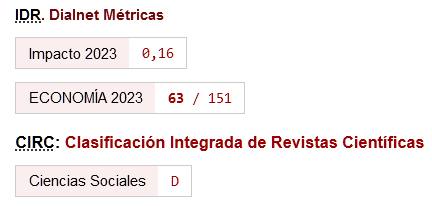El protocolo de Kyoto: la importancia y limitaciones de un tímido acuerdo
Palabras clave:
cambio climático, protocolo de Kyoto, economia españolaResumen
En este artículo introductorio se analizan las dificultades para llegar a acuerdos internacionales efectivos para controlar las emisiones de gases de efecto invernadero. Se sitúa la importancia que, a pesar de sus limitaciones, tiene el protocolo de Kyoto, el papel que en dicho protocolo tienen los llamados mecanismos de flexibilización y el compromiso específico de la Unión Europea. Finalmente, se plantea cuál es la difícil posición española en relación a su compromiso internacional y, en particular, frente a la aplicación de la directiva europea de comercio de emisiones.
Descargas
Citas
AGARWAL, A. y NARAIN (1991), S., Global warming in an unequal world. A case of environmental colonialism, Centre for Science and Environment, New Delhi, India.
AZAR, C. (2000), "Economics and distribution in the greenhouse", Climate Change, vol. 47: 233-238.
https://doi.org/10.1023/A:1005607931330
CAMPBELL, C.J. y J.H. LAHERRÈRE (1998), "The End of Cheap Oil", Scientific American, marzo.
https://doi.org/10.1038/scientificamerican0398-78
COASE, R. (1960), "El problema del coste social", en Aguilera Klink, F. y V. Alcántara (eds.), De la economía ambiental a la economía ecológica, Icaria, Barcelona, pp. 65-124.
DALY, H. E. (1999), "Steady-state economics: avoiding uneconomic growth" en J.C.J.M. van den Bergh (ed), Handbook of Environmental and Resource Economics, Edward Elgar, Cheltenham, UK.
https://doi.org/10.4337/9781843768586.00058
EUROPEAN ENVIRONMENT AGENCY (2001), Late Lessons from Early Warnings: the precautionary principle 1896-2000, Environmental Issue Report, n. 22, Copenhague.
HOWARTH, R. B. (2003), "Climate change" en Neumayer, E. (ed), International Society for Ecological Economics Internet Encyclopaedia of Ecological Economics. http://www.ecoeco.org/publica/encyc.htm.
INTERNATIONAL ENERGY AGENCY (2004), Key World Energy Statistics, www.iea.org.
KEUNING, S. J. et al (1999): "The Netherlands' NAMEA; presentation, usage and future extensions", Structural Change and Economic Dynamics, vol. 10: 15-37. https://doi.org/10.1016/S0954-349X(98)00058-7
MARTÍNEZ ALIER, J. y ROCA JUSMET, J. (2001), Economía ecológica y política ambiental, Fondo de Cultura Económica, México, segunda edición.
MICHAELOWA, A. (2003), "The Kyoto Protocol and its mechanisms" en Neumayer, E. (ed), International Society for Ecological Economics Internet Encyclopaedia of Ecological Economics. http://www.ecoeco.org/publica/encyc.htm.
RIECHMANN, J. (2002), "Introducción: un principio para reorientar las relaciones de la humanidad con la biosfera" en Riechmann, J. y Tickner, J. (coords.), El principio de precaución, editorial Icaria, Barcelona.
ROCA, J. y ALCÁNTARA, V. (2001), "Energy intensity, CO2 emissions and the environmental Kuznets curve. The Spanish case", Energy Policy, vol. 29/7, pp. 553-556. https://doi.org/10.1016/S0301-4215(00)00154-3
SCHMALENSEE, R. et al (1998), "An Interim Evaluation of Sulfur Dioxide Emissions", Journal of Economic Perspectives, Vol. 12. https://doi.org/10.1257/jep.12.3.53
STAVINS, R. N. (1998), "What Can We Learn from the Grand Experiment? Lessons from SO2 Allowance Trading", Journal of Economic Perspectives, Vol. 12. https://doi.org/10.1257/jep.12.3.69
Descargas
Publicado
Cómo citar
Número
Sección
Licencia
Esta licencia permite a terceros compartir (copiar y redistribuir el material en cualquier medio o formato) y adaptar (remezclar, transformar y crear a partir del material para cualquier finalidad, incluso comercial), siempre que se reconozca la autoría y la primera publicación en esta revista (La Revista, DOI de la obra), se proporcione un enlace a la licencia y se indique si se han realizado cambios en la obra.







